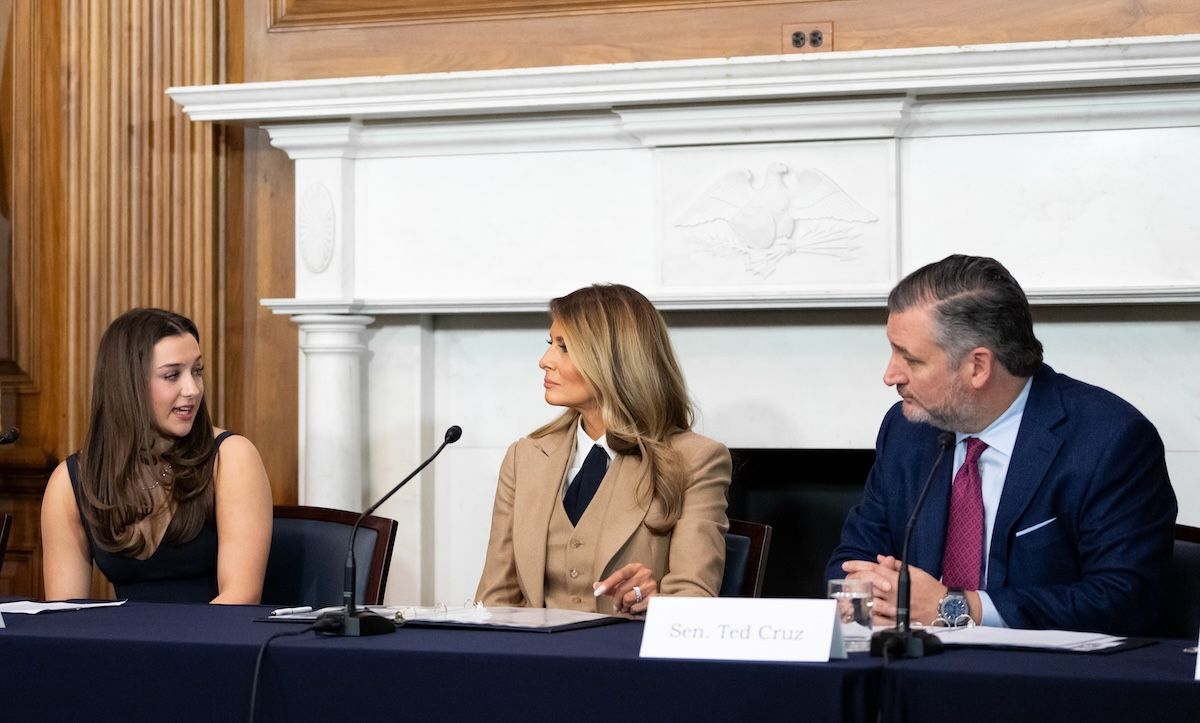April 2025 US Tech Policy Roundup
Rachel Lau, J.J. Tolentino, Ben Lennett / May 1, 2025Rachel Lau and J.J. Tolentino work with leading public interest foundations and nonprofits on technology policy issues at Freedman Consulting, LLC. Ben Lennett is the managing editor of Tech Policy Press.

First Lady Melania Trump and Sen. Ted Cruz (R-TX) participate in the March 2025 "Be the Best Roundtable on A.I. and Deepfakes," including discussing the TAKE IT DOWN ACT, which passed Congress this month. (Source)
As the Trump Administration completed its first 100 days, it was an incredibly busy and eventful month for tech policy in the US. The White House released two updated OMB memos—M-25-21 and M-25-22—outlining the federal government's AI use and procurement strategies. While these memos build on Biden-era frameworks by retaining roles like Chief AI Officers and processes for high-impact AI, the Trump Administration’s versions softened risk management mandates and narrowed the scope of regulated AI systems, while emphasizing investments in "American-Made AI."
The Administration also advanced two ongoing antitrust cases against big tech. In one case, the DOJ is in the remedy phase against Google after a court found it unlawfully maintained a monopoly over the search market. Meanwhile, the FTC began its court case against Meta, alleging the company engaged in anti-competitive behavior through its acquisitions of Instagram and WhatsApp.
As significant, the bipartisan TAKE IT DOWN Act (S.146/H.R.633) passed the House, 409-2. The bill previously passed the Senate in February and is expected to be signed by President Trump. The law introduces criminal penalties and mandates rapid takedown mechanisms for platforms hosting AI-generated explicit imagery. While victim advocacy groups praised the bill, civil liberties organizations warned it could harm online privacy and free speech. In addition, the House passed four bills, with another six bills advancing through committees in the House and Senate, while 11 new bills were introduced.
Read on to learn more about April developments in US tech policy.
White House Releases Updated OMB Memos for Federal AI Use and Procurement
Summary
The White House Office of Management and Budget (OMB) released two updated memos, Executive Order M-25-22, “Driving Efficient Acquisition of Artificial Intelligence in Government” and Executive Order M-25-21, “Accelerating Federal Use of AI through Innovation Governance, and Public Trust,” providing revised guidance on the federal government’s adoption, use, and procurement of AI tools across agencies. These directives came as the Trump Administration continued to roll back Biden-era policies and pursue its ambitious AI policy agenda to ensure the US remains the global leader in innovation while “maintaining strong protections for Americans’ privacy, civil rights, and civil liberties.”
Many provisions within each of Trump’s executive orders maintained elements established under the Biden Administration, including preserving Chief AI Officers to oversee federal agencies’ use of AI and utilizing special management processes for “high-impact” AI use cases. However, the new OMB memo introduced key differences in guidance compared to Biden’s previous recommendations, including narrowing the definition of covered AI systems, softening risk management obligations, and encouraging investments in “American-Made AI.”
Civil society organizations were encouraged by the OMB memos, but remained cautious about how the administration would implement and enforce such guidance. Quinn Anex-Ries, Senior Policy Analyst at Center for Democracy and Technology, stated that despite the memos maintaining “core AI governance requirements for federal agencies,” it remained to “be seen how faithfully this guidance will be implemented.” Cody Venzke, Senior Policy Counsel at the ACLU, noted that the ACLU would continue to monitor the “implementation of the guidance and advocating for stronger guardrails where protections have been scaled back or AI poses new harms.”
What We’re Reading
- “The 2025 AI Index Report,” Stanford University Institute for Human-centered AI.
- Ellen P. Goodman, “Accelerating AI in the US Government: Evaluating the Trump OMB Memo,” Tech Policy Press.
- Erica Chenoweth, “How AI Can Support Democracy Movement,” Tech Policy Press.
Google and Meta Face Antitrust Trials
Summary
Two major antitrust trials involving leading tech companies began this month in the US federal courts, with the Federal Trade Commission (FTC) heading to trial against Meta over its alleged social media monopoly and the Department of Justice (DOJ) engaged in a remedies trial against Google after a finding by a court that the company’s practices around search violated antitrust law. The Meta trial is expected to last for several months, with the Google trial expected to conclude in May, with a decision on remedies anticipated by August. The stakes in these trials are substantial, with potential consequences that could significantly alter the landscape of the internet.
The core of the FTC's case against Meta is the allegation that the company holds an illegal monopoly over "personal social networking services" and unlawfully maintained this power by acquiring potential competitive threats, specifically Instagram in 2012 and WhatsApp in 2014. The agency argues these acquisitions were exclusionary and intended to neutralize nascent competitors. Meta counters these claims, asserting that it faces fierce competition from various online services and that the FTC’s definition of the relevant market is flawed. If the federal government prevails against Meta, the court could be asked to order a breakup of the company, specifically by forcing Meta to spin off WhatsApp and Instagram.
In the Google case, a judge already found the company to have illegally maintained a monopoly in the search market, and the current trial focuses on how to address this finding and what remedies the court should impose. The DOJ is seeking significant remedies, including the divestiture of the Chrome web browser and potentially the Android operating system if other remedies are ineffective, along with requirements for data sharing and restrictions on future acquisitions and default agreements. Google, however, proposes more limited remedies centered on increasing flexibility in default agreements. The court will weigh these various proposals, ranging from less impactful behavioral changes to more aggressive structural separations like divestitures.
What We’re Reading
- Karina Montoya, “Analyzing Week One of Google Search's Antitrust Remedies Trial,” Tech Policy Press.
- Cristiano Lima-Strong, “What To Expect From Google’s Antitrust Remedies Trial Involving Search,” Tech Policy Press.
- Cristiano Lima-Strong and Justin Hendrix, “Podcast: A Guide to the FTC's Case Against Meta,” Tech Policy Press.
- Cristiano Lima-Strong, “FTC Heads To Trial To Break Up Meta: What You Need To Know,” Tech Policy Press.
TAKE IT DOWN Act Passes the House, Expected to Become Law
Summary
The "Tools to Address Known Exploitation by Immobilizing Technological Deepfakes on Websites and Networks Act," or TAKE IT DOWN Act (S.146), was co-sponsored by Senators Ted Cruz (R-TX) and Amy Klobuchar (D-MN). The bill unanimously passed the US Senate on February 13, 2025. A House version (H.R.633) also quickly advanced, passing the Energy and Commerce Committee on April 8, before the full House voted overwhelmingly 409-2 to pass the bill on April 28, sending it to the President's desk. President Donald Trump had previously vowed to sign the bill into law. First Lady Melania Trump actively supported the legislation, including hosting a White House roundtable to discuss the legislation.
The act establishes a federal law addressing non-consensual intimate imagery (NCII), including sexually explicit deepfakes or AI-generated content featuring identifiable individuals. The law includes criminal penalties for intentional disclosure, with higher penalties for images involving minors. A central feature is a notice and takedown (NTD) mechanism requiring "covered platforms" (including social media, websites, and messaging systems) to implement a clear reporting process for victims, provide conspicuous notice of this process, and remove reported content within 48 hours of a valid request. Platforms must also make reasonable efforts to remove identical copies. The law will primarily be enforced by the Federal Trade Commission.
Several organizations, including victim advocacy groups like RAINN and the National Center on Sexual Exploitation, applauded the passage of the bill. In a statement, RAINN (Rape, Abuse & Incest National Network), an anti-sexual violence organization that backed the bill, wrote that the “bipartisan passage of the Take It Down Act is a powerful statement that we stand united in protecting the dignity, privacy, and safety of our children.” Tech companies, including Meta and the tech industry-supported think tank, the Information Technology and Innovation Foundation, also supported the legislation. In contrast, some digital rights and civil liberties groups including the Center for Democracy & Technology and the Electronic Frontier Foundation (EFF) opposed the bill. In a statement, EFF argued, the law “presents a huge threat to security and privacy online. While the bill is meant to address a serious problem, good intentions alone are not enough to make good policy.”
What We’re Reading
- Jasmine Mithani, “House approves Take It Down Act, sending bill on intimate images to Trump’s desk,” The 19th.
- Slade Bond, “Why Congress Is On Sound Legal Footing To Pass The TAKE IT DOWN Act,” Tech Policy Press.
- Jasmine Mithani, “The TAKE IT DOWN Act Is Poised To Become Law. But Will It Provide Justice To Victims?,” Tech Policy Press.
- Sunny Gandhi and Adam Billen, “The US Senate’s Passage of the TAKE IT DOWN ACT is Progress on an Urgent, Growing Problem,” Tech Policy Press.
- Kaylee Williams, “Free Speech Advocates Express Concerns As TAKE IT DOWN Act Passes US Senate,” Tech Policy Press.
Tech TidBits & Bytes
Tech TidBits & Bytes aims to provide short updates on tech policy happenings across the executive branch and agencies, Congress, civil society, industry, and courts.
In the executive branch and agencies:
- President Trump signed an executive order aimed at enhancing education by promoting early access and exposure to AI in the classroom. This executive order established a White House Task Force on Artificial Intelligence Education, chaired by Michael Kratsios, Director of the Office of Science and Technology Policy. The order seeks to ensure that youth are adequately trained in AI tools to prepare them for their participation in the workforce.
- The Trump Administration unveiled plans to establish artificial intelligence data centers at 16 locations across land owned by the Department of Energy. The department hoped to begin operations at the center by the end of 2027. According to a memo obtained by Heatmap, planned locations included sites in Texas, Illinois, New Jersey, Colorado, among other locations.
- The White House blocked Nvidia’s unlicensed H20 AI chip sales to China and announced that future sales will require license approval. These restrictions were the first that the Trump Administration put on semiconductor sales abroad in an effort to limit chip exports to geopolitical rivals. Nvidia issued a statement claiming that it incurred a $5.5 billion loss as a result of the canceled H20 chip orders, but that the company would comply with the government’s orders.
- President Trump extended the deadline again for the Chinese company ByteDance to sell its US operations of TikTok to an American company for another 75 days. This continues the extension from its original deadline of January 19, 2025 to mid-June.
- The Department of Homeland Security (DHS) announced that it would scrutinize the social media accounts of people applying for legal residency, foreign students, or other types of immigration benefits for antisemitic activity.
- Office of Science and Technology Policy (OSTP) Director Mike Kratsios outlined his three-point plan for promoting American technological leadership at the Endless Frontiers Retreat, including “creatively allocating our public research and development dollars…constructing a common-sense, pro-innovation regulatory regime, and… adopt[ing] the incredible products and tools made by American builders.”
- The Government Accountability Office (GAO) published a report on generative AI’s potential risks to people and the environment, particularly its use of energy and water resources, lack of data privacy and accountability, as well as bias and cybersecurity concerns.
- The FTC issued a proposed order mandating that Workado, a reporting and monitoring company, stop advertising the accuracy of its AI Content Detector tool until they can produce competent and reliable evidence of the tool’s effectiveness.
- Secretary of State Marco Rubio announced plans to shut down the State Department’s Counter Foreign Information Manipulation and Interference Office, formally known as the Global Engagement Office. The office was originally established to counter foreign disinformation, but faced criticism by Republicans on the House Foreign Affairs committee who argued that its efforts inadvertently silenced conservative voices.
In Congress:
- The Senate Commerce Committee confirmed FCC nominee Olivia Trusty 21-7 as the third Republican Commissioner. Next, Trusty’s confirmation goes to the full Senate for approval.
- The House Select Committee on Strategic Competition between the United States and the Chinese Communist Party published a report on their investigation into Chinese AI chatbot DeepSeek, finding that DeepSeek exposes Americans’ data to the Chinese government, manipulates chatbot results to align with the Chinese Communist Party’s positions, and unlawfully utilizes US model distillation techniques and advanced chips.
- Almost 50 House Democrats signed a letter to the White House Office of Management and Budget (OMB) calling for the Trump Administration to “cease applying any unauthorized artificial intelligence system toward its effort to slash government spending,” raising concerns about employee monitoring, data security risks, and a potential conflict of interest if Elon Musk pursues government contracts as a special government employee.
- Sens. Marsha Blackburn (R-TN) and Richard Blumenthal (D-CT) wrote a letter to Mark Zuckerberg about a Wall Street Journal report on “how Meta’s AI-powered chatbots on Facebook and Instagram have engaged in sexually explicit conversations with users, including minors, often using the voices and personas of celebrities and fictional characters.”
- Sens. Chuck Schumer (D-NY), Maria Cantwell (D-WA), and Ed Markey (D-MA) sent a letter to the Chair of the FTC expressing concerns about the data privacy surrounding neural data generated by brain-computer interface (BCI) technologies. The letter urged the FTC to take action to secure neural data and highlighted the geopolitical and national security concerns around biological data privacy.
In civil society:
- Various civil society organizations, including the Center for American Progress, Electronic Privacy Information Center, and Center for Democracy and Technology, published responses to the House Committee on Energy and Commerce’s data privacy working group’s Request for Information issued in late February, seeking input on a federal data privacy and security framework.
In industry:
- An analysis of federal lobbying reports found that lobbying by the tech industry continued to grow, with Meta, Alphabet, Microsoft, ByteDance, X, and Snap spending over $17.5 million in the first quarter of 2025. Meta spent the most at $8 million, employing 85 lobbyists so far this year.
Legislation Updates
The following bills made progress across the House and Senate in April:
- Informing Consumers about Smart Devices Act - H.R.859. Introduced by Rep. Russ Fulcher (R-ID), the bill advanced out of the House Energy and Commerce Committee. The House later voted to pass the bill. A companion bill in the Senate, S.28, introduced by Sen. Ted Cruz (R-TX), advanced out of the Senate Committee on Commerce, Science, and Transportation.
- Promoting Resilient Supply Chains Act of 2025 - H.R.2444. Introduced by Rep. John James (R-MI), the bill advanced out of the House Energy and Commerce Committee. The House later voted to pass the bill. A companion bill in the Senate, S.257, introduced by Sen. Maria Cantwell (D-WA) advanced out of the Senate Committee on Commerce, Science, and Transportation.
- NTIA Reauthorization Act of 2025 - H.R.2482. Introduced by Rep. Robert Latta (R-OH), the bill advanced out of the House Energy and Commerce Committee. The House later voted to pass the bill.
- Foreign Adversary Communications Transparency Act - H.R.906. Introduced by Rep. Robert Wittman (R-VA), the bill advanced out of the House Energy and Commerce Committee. The House later voted to pass the bill.
- ROUTERS Act - H.R.866. Introduced by Rep. Robert Latta (R-OH), the bill advanced out of the House Energy and Commerce Committee. The House later voted to pass the bill.
- FUTURE Networks Act - H.R.2449. Introduced by Rep. Doris Matsui (D-CA), the bill advanced out of the House Energy and Commerce Committee. The House later voted to pass the bill.
- Secure Space Act of 2025 - H.R.2458. Introduced by Rep. Frank Pallone (D-NJ), the bill advanced out of the House Energy and Commerce Committee. The House later voted to pass the bill.
- Romance Scam Prevention Act - H.R.2481. Introduced by Rep. David Valadao (R-CA), the bill advanced out of the House Energy and Commerce Committee.
- Communications Security Act - H.R.1717 - Introduced by Rep. Robert Menendez (D-NJ), the bill advanced out of the House Energy and Commerce Committee.
- Deploying American Blockchains Act of 2025 - H.R.1664. Introduced by Rep. Kat Cammack (R-FL), advanced out of House Committee on Energy and Commerce. A companion bill in the Senate, S. 1492, was introduced by Sen. Bernie Moreno (R-OH).
The following bills were introduced across the House and Senate in April:
- NO FAKES Act of 2025 - H.R.2794. Introduced by Rep. Maria Elvira Salazar (R-FL), the bill would “protect intellectual property rights in the voice and visual likeness of individuals, and for other purposes.” A companion bill in the Senate, S. 1367, was introduced by Sen. Christopher Coons (D-DE).
- Protect Victims of Digital Exploitation and Manipulation Act of 2025 - H.R.2564. Introduced by Rep. Nancy Mace (R-SC), the bill would “amend title 18, United States Code, to prohibit the production or distribution of digital forgeries of intimate visual depictions of identifiable individuals, and for other purposes.”
- DELETE Act - H.R.2612. Introduced by Rep. Lori Trahan (D-MA), the bill would “establish a centralized system to allow individuals to request the simultaneous deletion of their personal information across all data brokers, and for other purposes.” A companion bill in the Senate, S.1287, was introduced by Sen. Bill Cassidy (R-LA).
- A DATA Access Transparency and Accountability Act of 2025 - H.R.2828. Introduced by Rep. Herbert Conaway (D-NJ), the bill would “direct the Secretary of Veterans Affairs to restrict the access and use of veterans’ data by the US DOGE Service and special Government employees, and for other purposes.”
- Protecting Data at the Border Act - H.R.2604. Introduced by Rep. Ted Lieu (D-CA), the bill would “ensure the digital contents of electronic equipment and online accounts belonging to or in the possession of United States persons entering or exiting the United States are adequately protected at the border, and for other purposes.”
- UNPLUGGED Act of 2025 - H.R.2700. Introduced by Rep. Eugene Vindman (D-VA), the bill would “require State educational agencies to implement policies prohibiting the use or possession of personal mobile phones by students in public school classrooms during school hours, and for other purposes.”
- Sammy’s Law - H.R.2657. Introduced by Rep. Debbie Wasserman Schultz (D-FL), the bill would “require large social media platform providers to create, maintain, and make available to third-party safety software providers a set of real-time application programming interfaces, through which a child or a parent or legal guardian of a child may delegate permission to a third-party safety software provider to manage the online interactions, content, and account settings of such child on the large social media platform on the same terms as such child, and for other purposes.”
- Maximum Support Act - H.R.2614. Introduced by Rep. Joe Wilson (R-SC), the bill would “establish a program and strategy to support internet freedom and counter censorship efforts in Iran, and for other purposes.”
- Content Origin Protection and Integrity from Edited and Deepfaked Media Act of 2025 - S. 1396. Introduced by Sen. Maria Cantwell (D-WA), the bill would “require transparency with respect to content and content provenance information, to protect artistic content, and for other purposes.”
- Artificial Intelligence and Critical Technology Workforce Framework Act of 2025 - S. 1290. Introduced by Sen. Gary Peters (D-MI), the bill would “expand the functions of the National Institute of Standards and Technology to include workforce frameworks for critical and emerging technologies, to require the Director of the National Institute of Standards and Technology to develop an artificial intelligence workforce framework, and periodically review and update the NICE Workforce Framework for Cybersecurity, and for other purposes.”
- Promoting United States Leadership in Standards Act of 2025 - S.1269. Introduced by Sen. Marsha Blackburn (R-TN), the bill would “promote United States leadership in technical standards by directing the National Institute of Standards and Technology and the Department of State to take certain actions to encourage and enable United States participation in developing standards and specifications for artificial intelligence and other critical and emerging technologies, and for other purposes.”
We welcome feedback on how this roundup could be most helpful in your work – please contact contributions@techpolicy.press with your thoughts.
Authors


